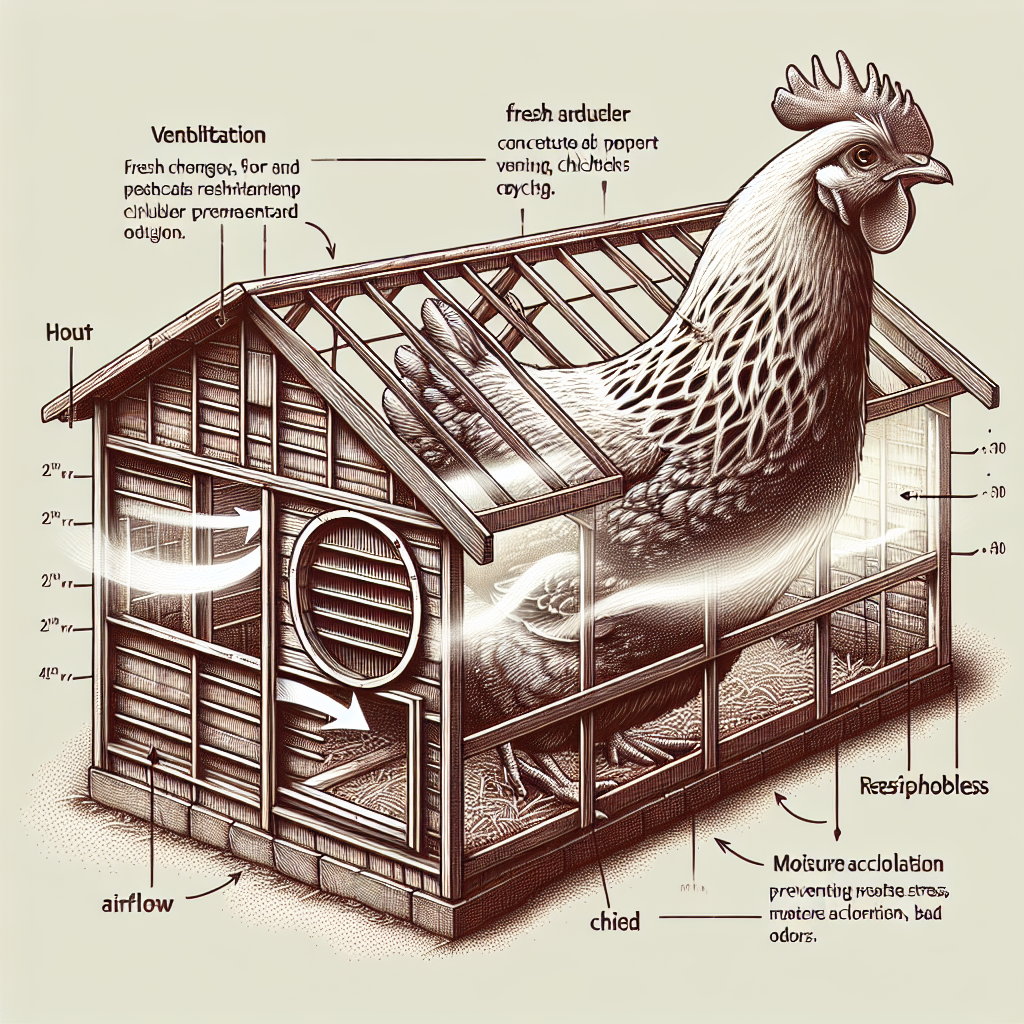If you’re a chicken owner looking to ensure the well-being and optimal health of your feathered friends, you may have wondered: how can I maintain optimal gut health in my chickens? The digestive system plays a crucial role in their overall health and productivity, so it’s important to understand how to support and maintain a healthy gut. In this article, we’ll explore some practical tips and strategies to promote optimal gut health in your chickens, ensuring they stay happy, healthy, and thriving.
Understanding the importance of gut health in chickens
The role of the gut in overall chicken health
The gut plays a crucial role in the overall health and well-being of chickens. It is responsible for digestion, absorption of nutrients, and elimination of waste. A healthy gut ensures efficient nutrient utilization, which is vital for proper growth, egg production, and immune function. Without a well-functioning gut, chickens may experience various health issues and reduced productivity.
Common gut health issues in chickens
Chickens are susceptible to several gut health problems, including coccidiosis, necrotic enteritis, and dysbiosis. Coccidiosis is caused by a parasite that damages the gut lining, leading to diarrhea, weight loss, and decreased feed efficiency. Necrotic enteritis is a bacterial infection that disrupts the balance of gut bacteria, resulting in intestinal lesions, reduced growth, and increased mortality. Dysbiosis refers to an imbalance of the gut microbiota, which can arise from stress, poor nutrition, or exposure to pathogens, and it can compromise the chicken’s immune system and overall health.
Impact of gut health on egg production and growth
The health of the gut directly affects egg production and growth in chickens. When the gut is functioning optimally, chickens can efficiently absorb and utilize nutrients from their diet, leading to improved growth rates and higher egg production. Conversely, gut health issues can hinder nutrient absorption and utilization, resulting in stunted growth and decreased egg production. To ensure optimal egg production and growth, it is essential to prioritize the maintenance of a healthy gut in chickens.
Benefits of maintaining optimal gut health in chickens
Maintaining optimal gut health in chickens offers numerous benefits. A healthy gut enhances nutrient absorption, leading to improved growth rates and higher egg production. It also strengthens the immune system, making chickens more resistant to diseases. Additionally, a well-functioning gut promotes overall well-being, reducing the risk of gut health issues and improving the quality of life for the chickens. By prioritizing gut health, chicken owners can ensure the longevity and productivity of their flock.
Providing a balanced and nutritious diet
Selecting high-quality chicken feed
Providing a balanced and nutritious diet is crucial for maintaining optimal gut health in chickens. High-quality chicken feed should contain a mix of grains, proteins, vitamins, and minerals that meet the nutritional needs of chickens at different stages of life. Investing in reputable brands of chicken feed and avoiding cheap, low-quality options can significantly contribute to the overall health and well-being of the chickens.
Including probiotics in the diet
Probiotics are beneficial bacteria that can promote a healthy gut microbiota in chickens. Including probiotics in the chicken’s diet can help maintain a balanced gut flora, improve nutrient absorption, and enhance the immune system. Probiotics can be administered through specially formulated feed additives or through natural sources like fermented foods or probiotic supplements. Consulting with a veterinarian or a poultry nutritionist can provide guidance on the appropriate probiotic strains and dosage for chickens.
Avoiding excessive use of antibiotics
While antibiotics can be useful in treating bacterial infections, their excessive use can disrupt the balance of gut bacteria in chickens. Overuse of antibiotics can lead to the development of antibiotic-resistant bacteria, making it harder to combat infections in the future. Therefore, it is important to minimize the unnecessary use of antibiotics and only administer them under veterinary supervision and when absolutely necessary.
Feeding a diverse range of foods
Offering a diverse range of foods can help support optimal gut health in chickens. Allowing chickens access to fresh greens, vegetables, and fruits not only provides essential nutrients but also encourages natural foraging behavior. Additionally, providing grit and oyster shell supplements can aid in digestion and support proper gut function. It is important to introduce new foods gradually and monitor the chickens’ response to ensure they tolerate and benefit from the variety in their diet.
Ensuring clean and hygienic living conditions
Maintaining a clean coop and nesting area
Cleanliness is paramount when it comes to ensuring optimal gut health in chickens. Regularly cleaning and removing waste from the coop and nesting areas can help prevent the buildup of bacteria and parasites that can jeopardize gut health. Bedding should be kept dry and replaced as needed to maintain a clean and hygienic environment for the chickens.
Regularly cleaning and disinfecting waterers and feeders
Waterers and feeders should be cleaned and disinfected regularly to prevent the growth and transmission of harmful bacteria or pathogens. This can be done by rinsing them with a mild detergent and thoroughly sanitizing them. It is important to ensure that fresh, clean water is always available to the chickens, as dehydration can quickly lead to gut health issues.
Proper waste management
Proper waste management is essential for maintaining optimal gut health in chickens. Regularly removing and disposing of chicken waste from the coop area can prevent the buildup of harmful bacteria and parasites that can affect gut health. Composting chicken manure appropriately can also contribute to maintaining a healthy environment.
Preventing overcrowding
Overcrowding can lead to stress and an increased risk of disease transmission among the flock. Chickens need adequate space to move, forage, and establish a pecking order. Providing enough room for each chicken to express natural behaviors helps reduce stress levels and promotes optimal gut health. Proper flock management, such as implementing appropriate stocking densities, can ensure chickens have sufficient space to thrive.
Managing stress levels
Providing adequate space and ventilation
Proper housing and ventilation are crucial for minimizing stress and maintaining optimal gut health in chickens. Providing adequate space per chicken, especially in confined areas, helps prevent overcrowding and reduces stress levels. Proper ventilation ensures a constant flow of fresh air, removing excess humidity and preventing the buildup of harmful gases that can compromise gut health.
Reducing noise and disturbances
Chickens are sensitive to noise and disturbances, which can cause stress and disrupt their gut health. Avoiding loud noises, sudden movements, and excessive handling can help maintain a calm environment for the chickens. Creating a quiet and peaceful space can contribute to their overall well-being and gut health.
Minimizing transport and handling stress
Transporting and handling chickens can be stressful for them, leading to a release of stress hormones that can impact their gut health. Minimizing transport time and providing secure and comfortable transport containers can help reduce stress levels. Additionally, handling chickens gently and minimizing unnecessary handling can minimize stress and support optimal gut health.
Implementing proper flock integration
Introducing new chickens into an existing flock should be done gradually and carefully to avoid excessive stress and potential aggression. Proper flock integration minimizes social stress and supports optimal gut health. Allowing sufficient time for chickens to establish a new pecking order and providing separate spaces during integration can help reduce stress levels and maintain a healthy gut.
Implementing good biosecurity practices
Keeping the flock isolated from wild birds
Interactions between domesticated chickens and wild birds can expose the flock to various diseases and parasites. It is important to prevent contact between the flock and wild birds by implementing physical barriers, such as netting or fencing. Minimizing exposure to wild birds helps reduce the risk of gut health issues and contributes to overall flock health.
Quarantining new birds or equipment
When introducing new birds or equipment into the flock, it is crucial to quarantine them before integration. This allows for proper observation and ensures that any potential health issues are identified and treated before exposing the flock. Quarantining new arrivals and equipment can help prevent the introduction of diseases that can compromise gut health.
Regularly monitoring and testing for diseases
Regular monitoring and testing for diseases are essential for maintaining optimal gut health in chickens. Observing chicken behavior, appearance, and droppings can help identify any potential health issues. Regular veterinary check-ups, fecal testing, and blood tests can provide a comprehensive assessment of the flock’s health and help detect gut health problems at an early stage.
Maintaining strict hygiene while handling poultry
Proper hygiene practices are crucial for minimizing the risk of disease transmission and maintaining optimal gut health in chickens. Washing hands thoroughly before and after handling chickens, using separate clothing and footwear for poultry areas, and regularly sanitizing equipment, such as egg collection tools, can prevent the spread of pathogens. Proper hygiene measures minimize the risk of gut health issues caused by external contamination.
Promoting natural foraging behavior
Allowing access to outdoor areas for foraging
Chickens naturally exhibit foraging behavior, which promotes gut health by diversifying their diet and increasing physical activity. Allowing chickens access to outdoor areas, such as a secure pasture or a designated foraging space, provides them with opportunities to search for insects, peck at vegetation, and engage in natural foraging behaviors. This supports a diverse gut microbiota and contributes to overall gut health.
Using chicken-friendly vegetation and insects
When designing outdoor foraging areas, it is important to include vegetation and insects that are safe and beneficial for chickens. Planting chicken-friendly herbs, such as mint, oregano, and basil, not only provide forage but also offer natural antimicrobial properties that can support gut health. Additionally, introducing beneficial insects, such as mealworms or black soldier fly larvae, can provide a protein-rich food source and stimulate natural foraging behavior.
Implementing rotational grazing practices
Implementing rotational grazing practices can help maintain optimal gut health in chickens. Rotational grazing involves periodically moving the chickens to different areas of pasture or foraging spaces. This practice allows for natural re-growth of vegetation and prevents the buildup of parasites in one area. Rotational grazing maximizes forage availability, reduces parasite burdens, and supports gut health in chickens.
Using enrichment activities to encourage natural behaviors
Providing enrichment activities can promote natural foraging behaviors and enhance gut health in chickens. Offering objects like straw bales, hanging vegetables, or treat dispensers stimulates chickens’ curiosity and encourages them to engage in natural behaviors. Engaging in these activities supports physical exercise, mental stimulation, and overall gut health.
Providing clean and fresh water
Using clean water sources
Clean and fresh water is essential for maintaining optimal gut health in chickens. Water sources should be clean, free from contaminants, and easily accessible to the chickens. Using clean water sources, such as a dedicated poultry water supply or freshwater from a reliable source, ensures that the chickens are hydrated and minimizes the risk of waterborne diseases that can affect gut health.
Regularly cleaning and disinfecting water containers
Water containers should be regularly cleaned and disinfected to prevent the growth of harmful bacteria and algae. This can be done by rinsing the containers and applying a mild disinfectant such as vinegar or a poultry-safe sanitizer. Regular cleaning ensures that the water remains fresh and uncontaminated, promoting optimal gut health in chickens.
Ensuring adequate water access at all times
Chickens should have access to clean and fresh water at all times. Dehydration can quickly lead to gut health issues and compromise overall health. Providing an ample supply of water and regularly checking water levels can help ensure that the chickens remain hydrated and maintain optimal gut health.
Avoiding water contamination
Water contamination can have detrimental effects on gut health in chickens. To avoid contamination, it is essential to prevent water sources from being polluted by feces, dirt, or other contaminants. Elevating water containers, using nipple or cup waterers instead of open water sources, and monitoring water quality can help minimize the risk of water contamination and support optimal gut health.
Identifying and treating gut health issues
Recognizing common symptoms of gut health problems
Being able to identify common symptoms of gut health issues is crucial for prompt detection and treatment. Symptoms can include diarrhea, decreased appetite, weight loss, poor feather condition, lethargy, and abnormal droppings. Recognizing these signs and monitoring the flock’s behavior and appearance on a regular basis can help identify gut health problems early on and prevent further complications.
Consulting with a veterinarian for proper diagnosis
When gut health issues are suspected, consulting with a veterinarian who specializes in poultry health is essential for proper diagnosis and treatment. A veterinarian can conduct a thorough examination, perform necessary tests, and provide appropriate medications or treatments tailored to the specific gut health problem. Seeking professional advice ensures accurate diagnosis and appropriate management of gut health issues.
Administering appropriate medication or treatment
After proper diagnosis, administering appropriate medication or treatment is crucial for resolving gut health issues. This may involve the use of specific medications, antibiotics, or supplements to address the underlying cause of the problem. It is essential to follow the veterinarian’s guidance and administer the medication or treatment as directed to achieve the best possible outcome for the chickens’ gut health.
Implementing preventive measures to avoid recurrence
To prevent the recurrence of gut health issues, implementing preventive measures is essential. This can include maintaining proper hygiene practices, providing a balanced and nutritious diet, and monitoring the flock regularly for any signs of relapse. By taking proactive steps to address potential risk factors and promote gut health, chicken owners can minimize the chances of gut health problems reoccurring in their flock.
Avoiding harmful substances and practices
Limiting exposure to pesticides and toxic substances
Exposure to pesticides and toxic substances can have detrimental effects on gut health in chickens. Avoiding the use of pesticides in and around the chicken coop, as well as preventing access to toxic substances, is crucial. This includes keeping chickens away from areas treated with herbicides, insecticides, or other chemicals that can contaminate their environment and compromise gut health.
Avoiding overuse of chemical dewormers
While dewormers are sometimes necessary to address internal parasites, the overuse of chemical dewormers can disrupt the balance of gut bacteria and compromise gut health. It is important to consult with a veterinarian to determine the appropriate deworming schedule and use alternative methods, such as herbal or natural dewormers when possible, to minimize the impact on gut health.
Maintaining proper medication dosage and withdrawal periods
When administering medications to chickens, it is crucial to follow proper dosage instructions and withdrawal periods. Overdosing or failing to respect withdrawal periods can lead to the accumulation of antibiotics or other medications in the chicken’s system, affecting gut health and potentially impacting human health through the consumption of eggs or meat. Adhering to proper medication protocols ensures the chickens’ gut health is not compromised by unnecessary exposure or residues.
Preventing accidental ingestion of harmful materials
Accidental ingestion of harmful materials, such as plastic, metal, or toxic plants, can have severe consequences on gut health in chickens. Maintaining a clean and safe environment, regularly inspecting feed and foraging areas for potential hazards, and providing appropriate enrichment activities can minimize the risk of ingestion and support optimal gut health.
Regular monitoring and assessment
Observing chicken behavior and appearance
Regular observation of chicken behavior and appearance is essential for detecting any signs of compromised gut health. Monitoring how they interact with each other, their energy levels, and any changes in feather condition or droppings can provide valuable insights into their gut health status. Early detection allows for prompt intervention and ensures the chickens’ gut health is maintained.
Regularly checking droppings and feed consumption
Checking the droppings regularly can provide important information about the chickens’ gut health. Healthy droppings should have a well-formed consistency and color, indicating proper digestion and nutrient absorption. Monitoring feed consumption is also crucial, as a significant decrease or increase in appetite can be an early indicator of gut health issues. Regularly evaluating droppings and feed consumption helps identify any abnormalities and allows for timely intervention.
Recording relevant data for tracking health trends
Keeping a record of relevant data, including feed consumption, weight gain, egg production, and any health issues or treatments, can help track and analyze health trends over time. This can be done through a simple spreadsheet or software dedicated to flock management. Regularly reviewing and analyzing the data can help identify patterns, potential triggers, and areas for improvement in gut health management.
Seeking professional advice when needed
While chicken owners can take many preventive measures to maintain optimal gut health, there may be situations that require professional advice. When facing complex or persistent gut health issues, seeking guidance from a veterinarian or poultry health specialist is crucial. Their expertise can provide additional insights, diagnostics, and treatment options to address specific gut health challenges and ensure the best possible care for the flock.
In conclusion, maintaining optimal gut health in chickens is essential for their overall well-being, growth, and productivity. By understanding the role of the gut in chicken health, providing a balanced and nutritious diet, ensuring clean and hygienic living conditions, managing stress levels, implementing good biosecurity practices, promoting natural foraging behavior, providing clean and fresh water, identifying and treating gut health issues, avoiding harmful substances and practices, and regularly monitoring and assessing the flock, chicken owners can proactively support optimal gut health and enjoy a thriving and productive flock. Remember, a healthy gut means happy and flourishing chickens!




